'In a country like ours, people talk about wanting to be like Singapore, but when it comes to paying taxes, they start criticising.'
'The medicine is bitter, but the long term effect is good,' Senthil Natarajan, who runs Kovai Pazamudhir Nilayam, a one of its kind fruit and vegetable chain in Tamil Nadu, tells Rediff.com's Archana Masih.
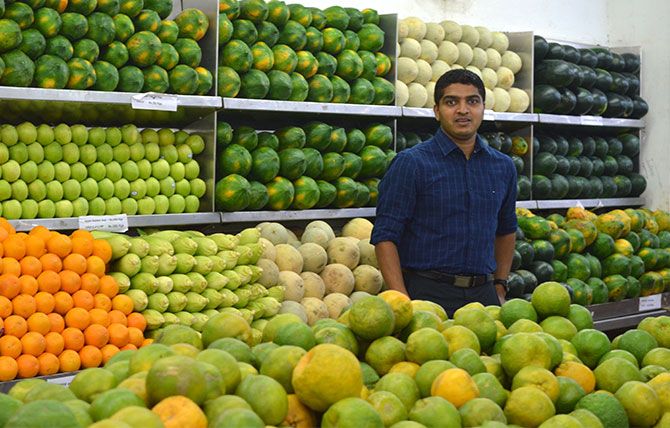
The colours and contours of the fruits and vegetables in the Kovai Pazamudhir Nilayam store in Coimbatore are a brilliant riot of every possible hue and shade.
The racks are neatly stacked as shoppers pick out and even get to taste a Nagpur orange before buying a few.
At the counter outside, fresh cut fruit and juices are sold over the counter.
On the shop floor, Senthil Natarajan, 35, managing director of the fruit/vegetable retail chain with 50 stores in Tamil Nadu, hovers over the day's produce.
"After the mango, the hill bananas are my favourite though I must confess I don't eat as much fruit as the rest of the family," he laughs.
Senthil came on board the family business in 2005 after obtaining a degree in software engineering and doing an internship at Microsoft in Hyderabad.
The business was started by his father and uncle who began by selling fruit in baskets. The brothers opened with one small store and owned half-a-dozen outlets when Senthil came on board.
Always fascinated with what software can achieve, he realised growth wasn't possible without systems and wrote software for his business to achieve this. Currently, he says the company offers online sales, loyalty points and uses data mining.
"If a store get fresh blueberries, we message customers who have bought it in the past to inform them. The future of shopping will be data mining," he says, sitting in a small office at the back of the store, one of the four he manages in Coimbatore.
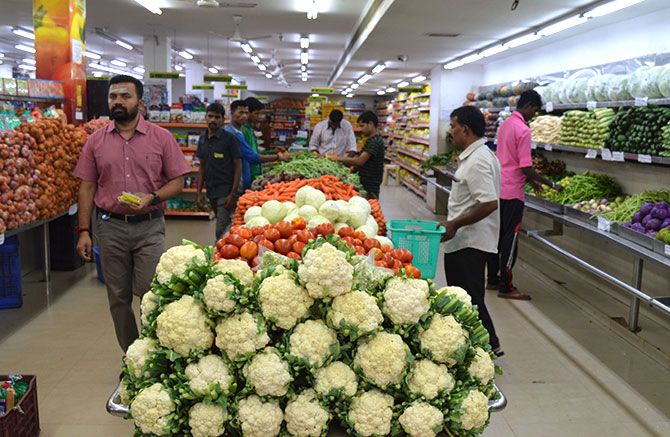
KVN employs 1,500+ employees and had a turnover of Rs 275 crore (Rs 2.75 billion) last year. It expects to grow the business by 20% plus this year.
"The backbone of the fruit and vegetable business is the supply chain. We have a huge network of suppliers at different points, consisting of small and big farmers. We don't take or give any credit period and pay immediately," he says.
Refrigerated trucks transport Kinnow oranges from Ganganagar on the India-Pakistan border and apples from Shimla and Kashmir.
A new transport system employs relay driving where drivers change at different stops so that they are rested for each leg of the journey. This has reduced travel time. A truck that used to reach Coimbatore in 10 days now arrives in 6.
Looking back at the year gone by after demonetisation, Senthil Natarajan says when he first heard the news from a partner, he thought it was a joke.
In the first two days when people could still use the old currency notes, sales went through the roof. After that, sales dipped for about 10 days.
"But in a few days, people started using credit cards. Credit card usage which used to be 2% to 3% of sales in Coimbatore suddenly went to 50% to 60%," he recalls.
"We bought more swipe (point of sale) machines and realised with credit cards people were buying more," he adds, "With cash customers plan and carry, with cards they go a little higher."
"The biggest turnaround of demonetisation and remonetisation was card usage. Without demonetisation, credit card usage would have remained at 5% and 95% would have been cash in Coimbatore. It would have been 10% and 90% in Chennai."
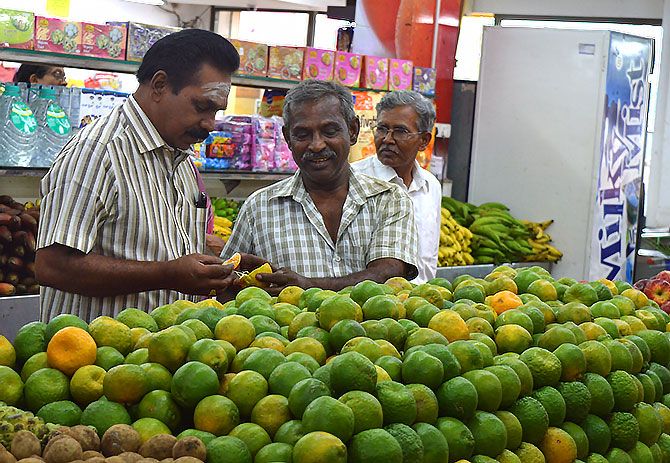
Most fruits in Senthil's stores come from north India.
The biggest section in the store is for bananas.
Tropical fruits like melons, papayas, custard apples are sourced from south India.
"Since fruits and vegetables do not attract tax, farmers were not averse to bank transfers," Senthil explains. "95% of dealings were already happening through bank transfers before demonetisation kicked in".
"So we didn't feel the pinch (of demonetisation). We thought it was better."
"Before demonetisation, a lot of farmers already had bank accounts because of the Jan Dhan Yojana. Once demonetisation happened they started using those accounts."
Senthil believes demonetisation was a positive move because one of the arguments against organised retail was that many players dealt in cash to avoid taxes.
"Demonetisation dealt a blow to the parallel economy that functioned and made profits without paying tax. Now everybody is forced to come into the tax bracket," he says.
Sales, he says, picked up in December. January-February was steady. Now a year on, business is doing better than before.
"There are all sorts of memes and jokes about demonetisation and GST. In a country like ours, people talk about wanting to be like Singapore, but when it comes down to paying taxes and when forced to do so they feel the pinch and start criticising."
"The medicine is bitter, but the long term effect is good," he says.
After demonetisation and GST, he says store-wise sales increased by 6% to 7%, which is in line with the nation's GDP. Criticism for the goods and services tax has come from traders who dealt in cash and were suddenly forced to register for and pay GST.
"Traders like me are pushing more people in the GST bracket. Less than 5% pay taxes in the country. Now we push any vendor connected with us to give us a GST bill."
"The chain reaction is working and in another 5, 6 months more people will have to get into the GST net."
"From my point of view," he explains, "the whole exercise is the best thing that could have happened. I always felt I used to pay all the taxes while somebody who was not in the tax bracket was playing in the same market -- the difference now is that it gives me a level playing field and encourages me to do better."
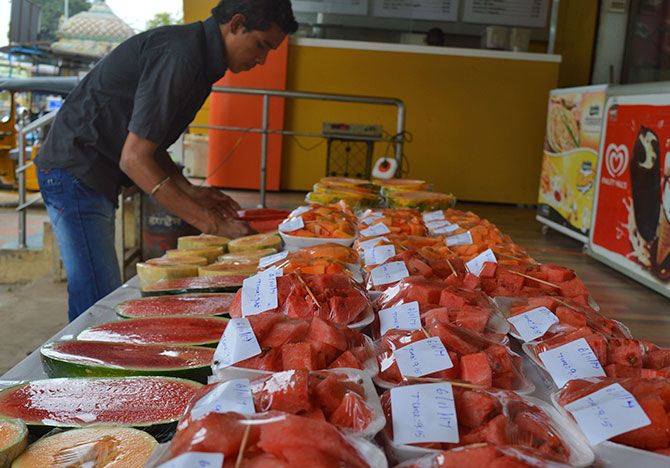
The other big positive of GST, he feels, that does not get highlighted is how the removal of toll check posts after GST has made crossing state borders hassle free.
Fruit/vegetable trucks would take 6 to 8 hours to cross a state border check post. Other trucks could take up to 24 to 48 hours to do so.
"Now trucks move freely between the states. Money was wasted on fuel and time was lost, all that has come down drastically."
On the flip side, he feels the government should have been more careful about what article goes into what GST bracket.
All daily grocery items should have been in the 5% and 12% GST slab, he says. "Now, 4 different slabs (5%, 12%, 18%, 28%) results in a lot of clerical work, more manpower to do entries and filings, but I think the government is listening and revising items."
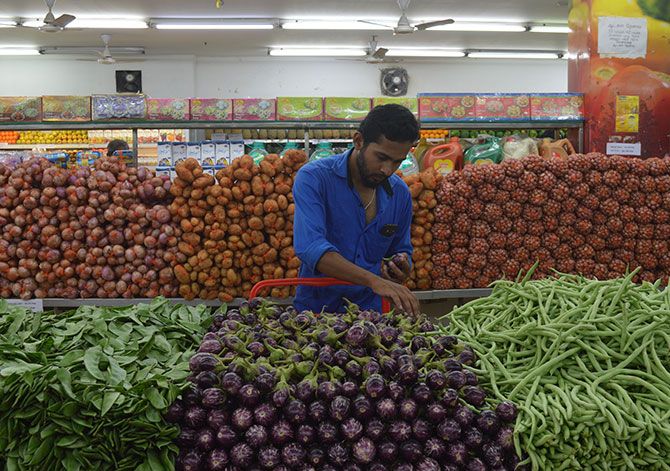
Positive about the growth of fruit/vegetable retail in India, his plans ahead include using the concept of "inglorious vegetables" that are not shaped well to make cold pressed juices.
"30% get wasted because of this," he says, "I want to make a video showing how by using the juices of these vegetables we can stop wastage."
He does not want cold pressed juices priced at a premium, but as low as Rs 30 for a cup. "I will never do a business that is not a habit-inducing business. It should be something that people have every day," he says.
Shelled pomegranates packed to ensure that they stay fresh for 8 to 10 days will be available at all his stores from December.
He also aims to sell these packed pomegranates at schools and airports for between Rs 30 and Rs 40. "It would be a better option than a pack of chips," says Senthil, the father of two young boys.
A five acre warehouse and cold storage in Chennai provides the facility to work on new projects like cold press juices.
It is the central point where all the fruit is procured and put through a grading system based on sweetness level, appearance and size. It is then despatched to stores according to ripeness and maturity.
On an average, 150 tonnes of fruit arrive at the warehouse each morning at 3 am, undergo all the quality control checks and get despatched by 7 am.
Of the 150 tonnes fruit, 750 kg turns out as wastage, so a vermicompost plant is being constructed to turn fruit into manure.
Senthil's company plans to supply the manure to farmers and also sell 1 kg vermicompost bags for kitchen gardens at their stores.
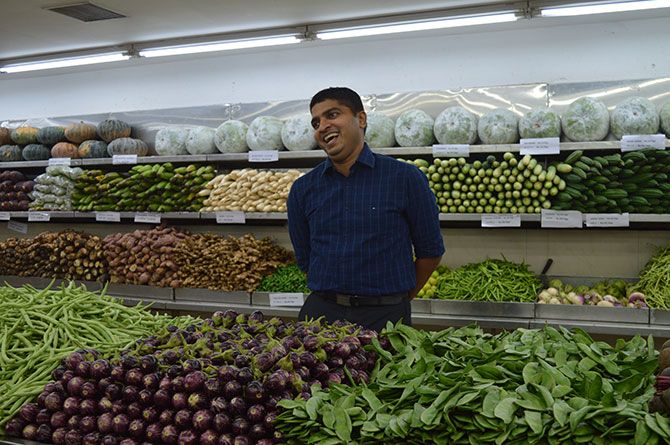
KPN also plans to venture into hydrophonic farming to test growing green leafy vegetables. Hydrophonic farming is very resource intensive and entails growing fruits and vegetables in a controlled environment.
Senthil also plans to expand his stores to Bengaluru and Hyderabad, but feels there is no rush. "We don't borrow and expand. We are slow in expanding, but steady in growth," he says.
His father and uncle started their first shop on the premise that when footwear could be sold inside a shop, why was fruit sold on the pavement.
With 50 shops and counting, says Senthil, "the success of our business is to be accessible to the neighbourhood. I can ensure that all the food that is being provided at my outlets is safe for the consumer, grown with good agriculture practices."
"That's what I want to leave as a legacy."











